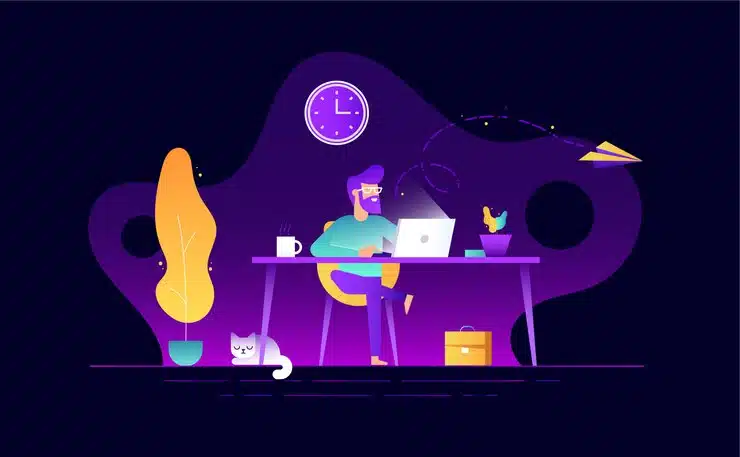Table of Contents
ToggleNight Shifts Jobs: In today’s world, many people work at night. This includes those in healthcare, hotels, transport, and more. The need for service around the clock is growing. But, working during the night can affect both your body and mind deeply.
The main problem is that night work disrupts our body’s natural clock. This internal clock is in the hypothalamus area of the brain. It creates rhythms that match our sleep and wake times with the light outside.
Working at night makes your body do things it shouldn’t at that time. This can make you feel tired, have trouble sleeping, or mess up your digestion. You might also find it hard to think clearly, feel moody, or get things done efficiently.
Key Takeaways : Night Shifts Jobs
- Night shift work disrupts the body clock, causing health problems.
- The SCN in the brain controls these rhythms, which go out of sync with night shifts.
- Night workers often feel sleepy, tired, have trouble sleeping, and lack focus.
- Switching to a night schedule can be tough, affecting both physical and mental health.
- Employers and night shift workers need to know and reduce these health risks.
Introduction to Night Shift Work
Night shift work is becoming more common, especially in a 24-hour economy. Many work industries, like healthcare, are relying on it. This allows emergency services to be available all day, every day. But, working at night has a big impact. It affects those working night shifts and the level of service they can offer.
The Rise of the 24-Hour Economy
Today, there is a high demand for services at all hours. This has pushed many businesses to work nonstop. Night shift workers play a key role during these nighttime hours. They keep operations going when most people are sleeping.
Prevalence of Night Shift Workers
Many healthcare workers, such as nurses and doctors, work night shifts to provide constant emergency care. But, the need for night work goes beyond healthcare. Jobs in transportation, manufacturing, and retail also require night shifts. This ensures these businesses can run smoothly around the clock.
Night shift work brings its own set of challenges. It impacts the worker’s health, the quality of service, and even the economy. Recognizing and addressing these issues is important. It helps in creating better ways to support and safeguard those who work at night.
Also Read : What Are The Main Types Of Education?
Circadian Rhythm Disruption
Changing the sleep and wake times causes stress in our bodies. This can make the natural body clock out of sync. For night shift workers, this can cause sleepiness, tiredness, and other issues. They might also have digestion problems and find it hard to think clearly. They could feel annoyed and less productive too.
The Role of the Suprachiasmatic Nucleus
The suprachiasmatic nucleus (SCN) is in the hypothalamus brain region. It acts like a clock, responding to light and dark. Night shift work messes up this internal clock. This hurts overall health and well-being.
Misalignment of Biological Processes
Working at night changes the body’s usual state. Things that should be active during the day, now work at night. This switch up messes with the body’s clock. It causes lots of health issues.
Also Read : What Skills Are Required For A Mechanical Engineer Job?
Sleep Disturbances

Night shift work can really mess with someone’s sleep patterns. This leads to less sleep and lower sleep quality. Because they sleep when their body says it’s time to get up, these people find it hard to sleep well.
Reduced Sleep Duration and Quality
Compared to daytime workers, people on the night shift sleep 2-4 hours less. They also don’t get as much of the important REM sleep stage. This means they end up really tired, making mistakes and accidents more likely, especially in the early hours of the morning.
Environmental Factors Affecting Sleep
For night shift workers, things like light and noise can be big problems. Day sleeping doesn’t offer the same dark, quiet environment as night sleeping does. So, it’s even harder for them to get good sleep. This mix-up of body time and outside signals makes it tough for them to sleep well.
Psychological and Mental Health Impacts

Night shift work can lead to sleep problems and mess up with body clocks. This can really hurt your mind and mood. Studies show that those working at night often feel more nervous, angry, and stressed due to tough work conditions.
Increased Risk of Anxiety and Depression
Working night shifts messes with sleep and can make people very tired. It also can make them more anxious, depressed, or moody. This might make it hard for them to go to work and some might need to take medicine to feel better.
Chronic Fatigue and Neuroticism
Not getting enough sleep because of night shifts can lead to tiredness and stress. It is hard for the body and mind to handle the opposite sleep schedule. This strain can cause a lot of emotional issues for those working at night.
Also Read : Scholarships For Online MBA Programs: A Complete Guide
Night Shifts Jobs and Gastrointestinal Issues
Working night shifts can really mess with your body’s digestive system. Between 20 and 75% of people who work overnight, compared to 10 to 25% who work days, have tummy problems. This happens because the body’s eating and digesting times don’t match due to night work.
Disruption of Digestive Functions
People working the night shift eat at odd hours, throwing off their digestive clocks. This causes issues like tummy discomfort, indigestion, and heartburn. It’s all because their meal times and body clocks don’t line up.
Increased Risk of Gastrointestinal Diseases
These eating and sleeping mismatches lead to more than just a sour stomach. Night shift workers are at higher risk for severe gut diseases like ulcers and irritable bowel syndrome. Eating processed foods makes these risks even greater.
Metabolic Disorders and Night Shift Work

Night shift work can disrupt the body’s natural rhythms. This can lead to problems with an individual’s metabolic health. People who work night shifts often face issues like being overweight or obese. They also tend to have higher levels of certain fats and cholesterol.
Obesity and Weight Gain
The main reasons behind these metabolic issues include a messed-up body clock and lack of good, consistent sleep. This can cause trouble with how we digest food. Also, it changes when and what we eat. People who work night shifts find it harder to eat well and exercise. Over time, this can cause them to gain weight and become obese.
Increased Risk of Type 2 Diabetes
Night shift work can make the body less able to manage sugar properly. This means it’s easier to develop type 2 diabetes. People might have more trouble tolerating glucose, their body might not respond well to insulin, and their sugar levels can stay high. This chain of events can eventually lead to a diabetes diagnosis.
Dyslipidemia and Metabolic Syndrome
Working night shifts is also linked to a type of dyslipidemia. This means there’s too much of some fats and not enough of others. Along with other metabolic issues, it raises the risk of metabolic syndrome. Metabolic syndrome is a group of health problems that can lead to heart disease and type 2 diabetes.
Also Read : Explore More, Spend Less: Budget Travel Strategies
Cardiovascular and Cancer Risks

Night shift work could lead to more than just trouble sleeping or issues with the body’s metabolism. Many studies link working at night to a higher chance of getting heart problems.
Elevated Risk of Ischemic Heart Disease
Research shows that people working night shifts have a 40% higher risk of heart disease. This risk is because working at night messes with your body clock. It makes you more likely to have habits like smoking, being overweight, and having high cholesterol.
Potential Link to Cancer Development
Working night shifts might also raise the risk of getting certain cancers, research suggests. The exact reasons aren’t clear. But, it might be because working at night messes with natural body rhythms and lowers a key hormone, melatonin.
Also Read : Top 10 Must-visit Traveling For Adventure Seekers
Work-Life Balance and Family Impacts
Working night shifts can be hard for maintaining a healthy life and a strong family. Studies have shown that night shift work affects how well we juggle work and family time. It also affects children’s growth and how families get along.
Challenges in Maintaining Family Life
Night Shift work is irregular and unpredictable. This makes it hard for workers to join in on family moments, be at key events, and take care of things at home. Workers often feel guilty or strained because they can’t give enough time to both work and family.
Effects on Children’s Well-Being
When parents work night shifts, it can mess up the family’s sleep schedules. This means parents are tired during the day when they should be with their kids. If parents can’t be there enough, kids may feel less secure, and they might have trouble in school or acting out.
Marital and Relationship Strain
Night shift work can damage marriages and love relationships. With changing schedules, less time for each other, and different sleep habits, couples may struggle to connect. This can lead to arguments, less closeness, and even break up marriages or relationships.
Also Read : Job Skills: What Are The Most In Demand Skills In Today’s Workplace?
Conclusion
In short, working night shifts can really mess up your health and happiness. It messes with your body’s natural clock, leading to sleep problems and mood swings. It even makes you more likely to have health issues like heart problems and troubles with digestion.
Night shift work doesn’t just hurt the worker. It can lead to less work getting done and more accidents, especially in some jobs. It’s important for companies and those in charge to help night workers stay healthy and feel well.
With the world working around the clock more than ever, we need to find ways to help night workers. This might mean letting them work more flexible hours or giving them advice on how to sleep better. It’s all about making sure they can take care of themselves while doing their job well.
FAQs
Q: How does working night shifts jobs affect your health?
A: Working night shifts can have a negative impact on your health due to disruptions in your circadian rhythm, which can lead to sleep disturbances, increased risk of chronic diseases, and mental health issues.
Q: What are some common night shift jobs that individuals might have?
A: Some common night shift jobs include night auditor, technician, operator, nurse, security officer, janitor, dispatcher, and airport personnel.
Q: What are the possible effects of working overnight shifts on one’s body?
A: Working overnight shifts can disrupt your body’s natural sleep-wake cycle, leading to fatigue, decreased immune function, digestive problems, and increased risk of cardiovascular diseases.
Q: How can individuals minimize the negative impacts of working night shifts on their health?
A: To minimize the negative impacts of working night shifts, individuals can prioritize good sleep hygiene, maintain a consistent schedule, eat a balanced diet, stay physically active, and seek support from healthcare professionals if needed.
Q: Are there any tips for adjusting to a night shift schedule?
A: Some tips for adjusting to a night shift schedule include creating a dark and quiet sleep environment, limiting exposure to bright light before bedtime, avoiding caffeine and heavy meals close to bedtime, and establishing a relaxing bedtime routine.
Q: How does shift differential work for night shift workers?
A: Shift differentials are additional payments given to employees who work during non-traditional hours, such as night shifts. Night shift workers usually receive a higher pay rate compared to those working during daytime hours to compensate for the inconvenience.
Q: What are some potential career opportunities for individuals interested in night shift jobs?
A: Individuals interested in night shift jobs can explore roles such as night auditor, security officer, technician, nurse, operator, dispatcher, janitor, and airport personnel. These positions may offer full-time, part-time, or remote work options.





